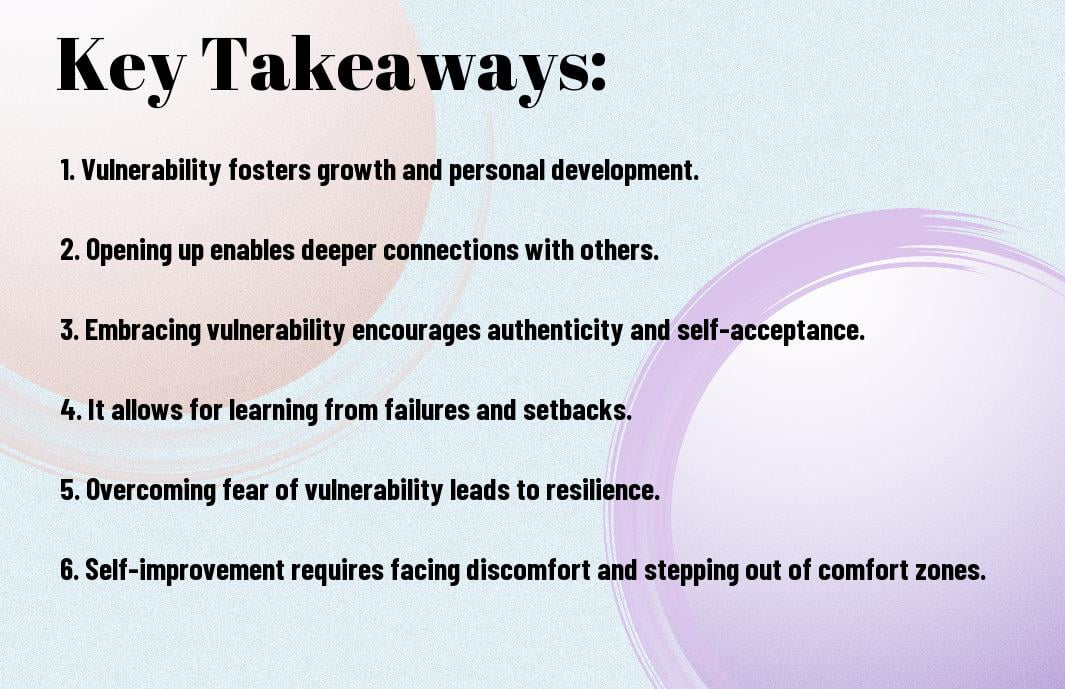#SelfImprovement often requires stepping out of one’s comfort zone, and embracing vulnerability is no exception. Contrary to common belief, vulnerability is not a sign of weakness, but rather a crucial ingredient for personal growth and self-improvement. By allowing ourselves to be vulnerable, we open the door to authentic connections, emotional resilience, and deep self-awareness. In this blog post, we will explore why vulnerability is important for anyone looking to enhance their well-being and personal development.
Key Takeaways:
- Vulnerability fosters growth: Embracing vulnerability allows individuals to acknowledge their weaknesses and areas of improvement, leading to personal growth and self-improvement.
- Vulnerability promotes empathy: By being vulnerable, individuals can connect with others on a deeper level, fostering empathy and understanding, which can aid in personal development.
- Vulnerability builds resilience: Embracing vulnerability and learning from setbacks can help individuals build resilience, bounce back from failures, and continue their journey of self-improvement with a stronger mindset.
Understanding Vulnerability
Defining Vulnerability in Personal Growth
With vulnerability in personal growth, it is about embracing our imperfections, fears, and emotions with courage and honesty. It involves being open to uncertainties and risks, allowing ourselves to be authentic and true to our feelings.
Psychological Perspectives on Vulnerability
For psychologists, vulnerability is seen as a key aspect of emotional intelligence and interpersonal relationships. It involves the willingness to expose oneself emotionally, which can lead to deeper connections and personal growth. Vulnerability is not a sign of weakness, but an indication of strength and resilience in facing challenges.
For instance, vulnerability allows individuals to build trust and intimacy in relationships. By sharing our vulnerabilities with others, we create opportunities for empathy, support, and understanding. However, it is important to exercise caution and discernment in choosing whom to trust with our vulnerabilities, as not everyone may respond with care and respect.

Vulnerability as a Catalyst for Self-Improvement
The Role of Emotional Exposure
While facing our vulnerabilities can feel uncomfortable, it is an imperative step towards self-improvement. An individual must be willing to embrace their emotions and expose themselves to discomfort in order to grow.
Learning from Failures and Mistakes
An important aspect of vulnerability in self-improvement is its role in learning from failures and mistakes. Being open to vulnerability means acknowledging when we’ve made errors and using them as valuable lessons for personal growth.
For instance, instead of shying away from failures, one can recognize them as opportunities for self-reflection and learning. Embracing vulnerability enables us to learn from our mistakes, adapt, and become better versions of ourselves.
Barriers to Embracing Vulnerability
Societal and Cultural Factors
To investigate into the barriers of embracing vulnerability, societal and cultural factors play a significant role. In a world that often equates vulnerability with weakness, individuals may fear being judged or stigmatized for showing their true emotions. Social constructs and norms can discourage people from being open about their struggles, creating a facade of strength instead. This can hinder self-improvement as it prevents individuals from seeking help or support when needed. This perpetuates a cycle of shame and isolation.
Personal Fears and Resistance
On a personal level, fears and resistance can act as formidable barriers to embracing vulnerability. Fear of rejection, failure, and inadequacy can prevent individuals from stepping out of their comfort zones and addressing their vulnerabilities. This fear of being vulnerable stems from a deep-seated discomfort with facing one’s insecurities and exposing them to others. Overcoming these personal hurdles is crucial for personal growth and self-improvement.
Strategies to Cultivate Vulnerability
Mindfulness and Self-awareness Techniques
All self-improvement journeys start with self-awareness. One effective way to cultivate vulnerability is through mindfulness practices. This involves being fully present and aware of your thoughts, emotions, and physical sensations without judgment. By developing this level of self-awareness, you can better understand your fears and insecurities, making it easier to embrace vulnerability as a path to growth.
Building a Supportive Environment
Any individual seeking to embrace vulnerability for self-improvement needs a supportive environment. Surround yourself with people who encourage authenticity and support your journey towards growth. Whether it’s friends, family, or a professional network, having a safe space to share your vulnerabilities can provide the necessary encouragement and validation needed to stay committed to your personal development goals.
Mindfulness practices can help individuals navigate their emotions and thoughts, providing a solid foundation for embracing vulnerability. Keep in mind, building a supportive environment is crucial in this process, as it can significantly impact your willingness to be vulnerable and open to self-improvement.

Final Words
From above discussion, it is evident that vulnerability is indeed imperative for self-improvement. By accepting our flaws and being open to change, we can confront our fears and make progress in personal growth. Embracing vulnerability allows us to connect with others on a deeper level and fosters empathy and resilience. It is through vulnerability that we can truly transform and become the best versions of ourselves.
FAQ
Q: Is vulnerability necessary for self-improvement?
A: Yes, vulnerability is necessary for self-improvement as it allows individuals to acknowledge their weaknesses and areas for growth. By being vulnerable, individuals can open themselves up to new perspectives, feedback, and experiences that can help them learn and develop personally and professionally.
Q: How does vulnerability contribute to personal growth?
A: Vulnerability contributes to personal growth by fostering authenticity and emotional intelligence. When individuals are willing to be vulnerable, they demonstrate courage and resilience in facing their fears and insecurities. This willingness to be open and honest with oneself and others can lead to deeper self-awareness and meaningful connections with others.
What are some ways to embrace vulnerability for self-improvement?
A: To embrace vulnerability for self-improvement, individuals can practice self-reflection, engage in open and honest communication with others, and seek feedback and guidance from trusted sources. It is important to cultivate a growth mindset and be willing to step outside of one’s comfort zone in order to learn, grow, and become the best version of oneself.




